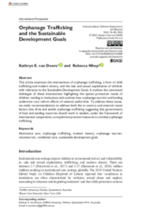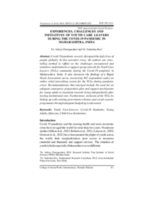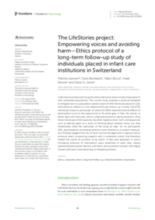Displaying 91 - 100 of 771
This webinar looked at ways to raise awareness among the general public on the right to independent living and the harm of institutionalisation for the entire society.
This article examines the intersections of orphanage trafficking, a form of child trafficking and modern slavery, and the sale and sexual exploitation of children with reference to the Sustainable Development Goals. It outlines the contextual challenges of these intersections highlighting the special protection needs of children residing in institutions and outlines how orphanage tourism and funding undermine care reform efforts of national authorities.
This new study reveals that over 120,000 children in Thailand are living in institutional settings, mostly due to poverty and limited access to education. 90% have at least one living parent. Although institutional care may be appropriate in emergencies, it is often overly misused and can affect children’s emotional, cognitive and mental development. More than 50% of private “orphanages” are unregistered and unregulated.
This webinar was hosted by the Evidence for Impact Working Group of the Transforming Children’s Care Collaborative on March 30, 2023, and examined the Early Institutionalization Intervention Impact Project in Brazil.
The COVID-19 pandemic severely disrupted the daily lives of people globally. In this narrative essay, the authors use the story-telling method to reflect on the challenges encountered and initiatives undertaken by a support group network for Youth Care Leavers (YCLs) community during the COVID-19 pandemic in Maharashtra, India.
The current study assesses a protocol designed to mitigate risks in a population-based cohort of 246 individuals placed in care institutions as infants in a non-selective 60-year follow-up. In total, 116 (47%) individuals chose to participate, of whom 53 (55%) reported positive effects of participation such as the opportunity to fill some gaps in their life stories, to better deal with their past, and to understand previous family dynamics.





